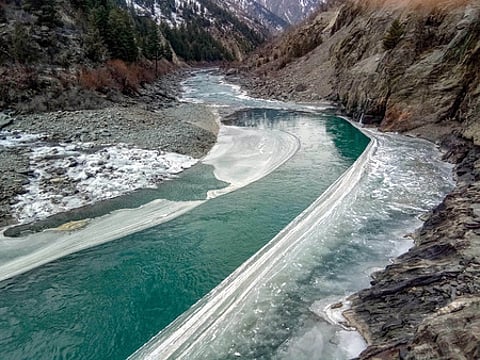

The Government of Pakistan has raised serious concerns over reduced water flows in the Chenab River from India, warning that the shortfall could severely impact both early and late Kharif crops in the country. The claim, made by Pakistan’s Indus River System Authority (IRSA), centers around insufficient water releases at the Marala-Ravi Link (MRL) Canal, a critical irrigation source located in Punjab, Pakistan.
According to IRSA, the early Kharif period — running from May to June 10 — is particularly vulnerable to sudden fluctuations in water availability. The late Kharif season, which spans from June 11 to September, is also expected to be affected if the current situation continues.
In a statement released after the IRSA Advisory Committee (IAC) meeting held on May 5 at the IRSA headquarters in Islamabad, Chairman Sahibzada Muhammad Shabir highlighted concerns over the significant decrease in Chenab River inflows at the Marala headworks. The decrease has been attributed to short water supplies from upstream India, where the Chenab originates in Jammu and Kashmir.
“The sudden drop in inflows at Marala is alarming,” the statement noted. “It poses a direct threat to the irrigation requirements of early Kharif crops, which are crucial for Pakistan’s agricultural output and food security.”
The IAC meeting, which brought together water experts and provincial representatives, reviewed the current and projected water availability for the ongoing Kharif season. The committee estimated an overall water shortage of between 21% and 7% for the entire season. To mitigate the impact, IRSA announced that the deficit would be managed through the conjunctive use of the country's major reservoirs.
Despite these measures, agricultural stakeholders have expressed concern that a prolonged shortage in river flows could lead to reduced crop yields, particularly for water-intensive crops like cotton, sugarcane, and rice. Farmers in Punjab and Sindh, who are heavily reliant on irrigation from the Chenab and other rivers in the Indus basin, are likely to bear the brunt of the reduced supply.
IRSA has called on India to adhere to its water-sharing commitments under the Indus Waters Treaty, which governs the allocation and management of rivers shared between the two countries. Under the treaty, the Chenab River is designated for Pakistan’s use, although India retains limited rights to non-consumptive uses such as hydroelectric power generation.
Officials from IRSA have also urged Pakistani authorities to monitor the situation closely and maintain coordination with India to ensure transparency and compliance with treaty obligations.
As the Kharif season progresses, IRSA is expected to release further updates on the water situation and may recommend additional measures to manage the expected shortfall.